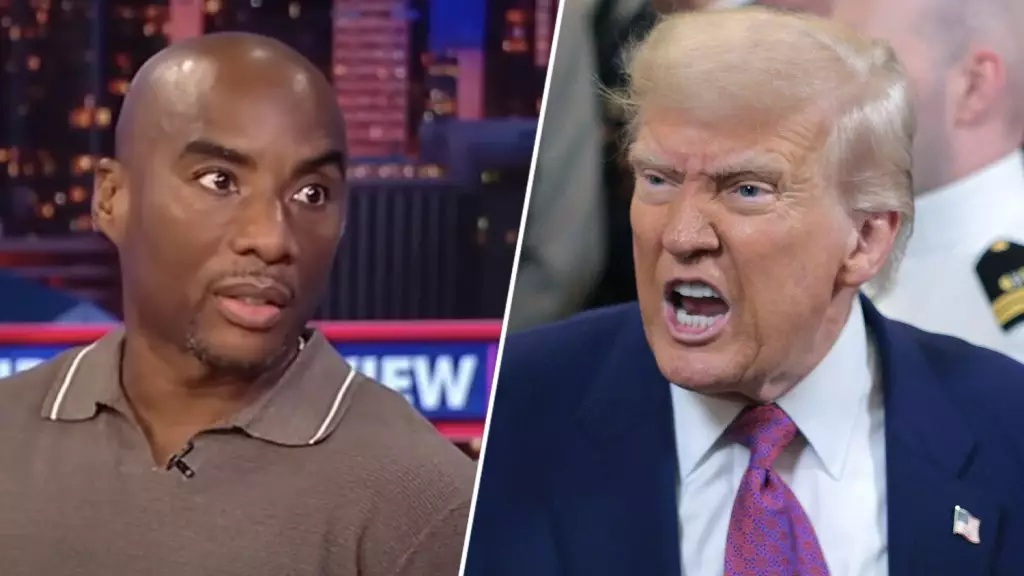The recent tensions that have roiled the Republican Party reveal a deeper, underlying fracture within the conservative ranks. Rather than presenting a unified front, many traditional conservatives are beginning to push back against the increasingly populist and polarizing tactics championed by Donald Trump and his loyalists. This escalating discord signals a potential shift in the party’s future direction—one that could either forge a more principled conservative movement or plunge it into prolonged chaos. Charlamagne Tha God’s pointed observations about a “political coup” highlight a brewing rebellion: a desire among long-time Republicans to reclaim the party from what they perceive as harmful extremes.
This internal struggle is reminiscent of a civil war with ideological trenches. On one side, Trump continues to wield immense influence over the MAGA base, fueling narratives that dismiss critics and deepen divisions. On the other, a growing cadre of tradition-minded conservatives recognizes the necessity of distancing themselves from traits and controversies that threaten to alienate moderate voters and tarnish the party’s future electoral prospects. The inclusion of figures like Jon Stewart in the conversation underscores this schism—trusted voices outside the entrenched political elite are challenging the status quo and advocating for a return to more rational, fact-based politics.
Furthermore, the discourse surrounding issues like Jeffrey Epstein’s scandal exemplifies how the party’s narrative is becoming increasingly fractured. Trump’s emotional reactions to the scandal and his selective engagement with the media reflect an internal tension over how serious allegations are handled within the party. While certain outlets like the Wall Street Journal report on these issues, others, including Fox News—Trump’s favored platform—shrug off the scandals, illustrating competing agendas within the conservative media landscape. This divergence fuels confusion among the base and complicates efforts to craft a coherent, unifying message.
The Role of Media and Personalities in Shaping Political Realignment
The battle over narrative control extends beyond traditional party lines, with media personalities playing a decisive role in shaping public opinion. Charlamagne Tha God’s critique of Trump and the broader Republican establishment exemplifies how influential voices outside formal politics are increasingly shaping the ideological landscape. His candid commentary, which calls attention to the potential “takeover” of the party by traditional conservatives, taps into a growing discontent that recognizes the current GOP as more of a personality cult than a political ideology rooted in policy.
Meanwhile, Trump’s reaction to such criticism—lashing out vehemently and attacking Charlamagne personally—serves as a textbook example of how the former president’s tactics are rooted in defensive posturing. Instead of engaging with substantive points, Trump relies on ad hominem attacks, revealing his fragility and the increasing difficulty he faces in maintaining control over narratives that threaten his dominance. The social media outbursts, filled with exaggerated capitalization and insults, often betray a leader who perceives himself under siege, heightening the perception that his grip on power is weakening.
Media outlets also play a disturbing role in this dynamic. While partisan outlets continue to bolster Trump’s base, more moderate or investigative journalism is exposing uncomfortable truths—like the close ties between Trump and Jeffrey Epstein—that further fracture the party’s image. The reluctance of Fox News to pursue or highlight these issues intensifies the sense of a media-driven cover-up, fueling conspiracy theories and further widening the ideological chasm.
The Future of the Republican Party: A Crossroads of Ideology and Identity
The question looming over American politics is whether the GOP will evolve into a more traditional, policy-focused party or remain tethered to the populist, often chaotic identity it has cultivated. Charlamagne Tha God’s suggestion that the base might embrace a more conventional conservative approach—focused on facts rather than personalities—marks a significant departure from the Trump era. It signals that a considerable segment of the party’s future may involve distancing itself from the cult of personality and embracing a more pragmatic, policy-driven ideology.
This ideological tug-of-war also opens the door for potential leadership changes. Figures like Jon Stewart, suggested as a future candidate, embody a move toward a more centrist, articulate opposition that could redefine the party’s future strategy. Similarly, Kathy Harris’s potential re-election hints at an ongoing debate about whether capable, experienced politicians can steer the party back toward stability and credibility.
Ultimately, the future hinges on whether leadership within the GOP recognizes the peril of straying further from core democratic principles in pursuit of electoral gains. Their ability to reconcile the deep divisions—both ideological and personal—will determine whether the Republican Party becomes a coalition of pragmatic conservatives, a populist insurgency, or a fractured entity incapable of governing effectively. The coming months are likely to be a pivotal period in shaping the trajectory of one of America’s most influential political parties.

